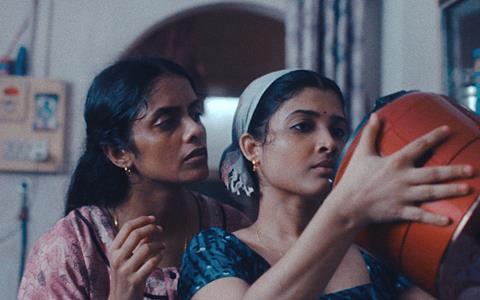Payal Kapadia’s eloquent fiction debut follows three women attempting to find their place in modern Mumbai

Dir/scr: Payal Kapadia. India/France/The Netherlands/Luxembourg. 2024. 115mins
All cities are crossroads, transitory beacons of artificial light which attract visitors and those who stay forever but who will always remain visitors. Mumbai is its own special case; something that Payal Kapadia eloquently pleads in All We Imagine Is Light, the first Indian film to play in Cannes Competition in three decades. It’s a light for audiences to surrender to, a realist-infused story of three women broadly representing three generations in a city where their hold is fragile, where their breaths barely leave a mist of a trace. This fiction debut from a talented documentarian brings to mind the work of Lucrecia Martel or Alice Rohrwacher, yet there’s a strong romantic streak that also calls to mind Wong Kar-wai’s great love affair with the city of Hong Kong.
Art-house audiences should respond to the opportunity to follow this beautifully-shot, gentle story
Mumbai lives and breathes here too – the monsoon rains pour tears into a place ‘that isn’t real…[where] you could vanish into thin air” – and when the film’s protagonists leave the city for what is intended to be a quick trip to a beach-side village, it weighs on their actions: their sense of fate, agency, and, ultimately, freedom. Mumbai-based Kapadia won the Golden Eye for best documentary at Cannes in 2021 for her Directors’ Fortnight premiere A Night Of Knowing Nothing. All We Imagine As Light delivers on all of that promise and more: art-house audiences should respond to the opportunity to follow this beautifully-shot, gentle story as it eventually follows its own intriguing mysticism.
Prabha (Kani Kusruti), a senior sister, and Anu (Divya Prabha), her more junior colleague (and room-mate), work at a Mumbai hospital specialising in women’s health. Prabha is serious and sad, overly-responsible, kind, cautious and desperately lonely. After a brief, arranged marriage, her husband moved to Germany to work and hasn’t contacted her for a year. The arrival of a rice cooker – an anonymous gift from Europe – upsets her equilibrium. Anu is flighty, irrepressible, yet essentially good-hearted. She borrows her rent money from Prabha and is secretly seeing a Muslim boy named Shiaz (Hridhu Haroon).
A third character, the hospital cook Parvaty (Chhaya Kadam), embodies the reality of their Mumbai: evicted from her shanty house after two decades, she could be their future. Right now, however, she’s their present, as she returns alone to her home village after a life on the margins of a city which, as Kapadia’s roaming camera shows, is always on the move. From a long opening tracking shot down a street, accompanied by voice over testament of the city’s residents, Mumbai is swollen and surging, its train doors opening and disgorging and filling again.
If it’s a surprise that it’s all so beautiful for Kapadia’s lenses, it’s also a relief that it’s all so natural. She’s certainly besotted with the lavenders and blues of the nurses uniforms and billowing saris – on the clothes line or drying in the breeze of an open window – and their are times when the very monsoon seems to be shedding purple tears. But, like the main protagonist Prabha, this is a serious film which refuses to be distracted by an easy colour-pop.
The focus here is female. At the hospital, women deal with women, while life in Mumbai deals with women in its own particular way. Always present is the understanding of just how difficult it is for these independent women to have a hold on their own lives, to get a rooted place in a modern India which is so concerned with how they conduct themselves. Arranged marriages can’t be left. Hindu and Muslim can’t be in relationships. Widows can’t have papers. Yet All We Imagine As Light is not absolute: its men are vulnerable too, from the kind-hearted Dr Manoj (Azees Nedumangad) to the besotted Shiaz. Everyone makes their way around Mumbai in the rain, all these workers uprooted from their villages and uprooted again in India’s relentless modernisation: in the village, though, the India from whence they all came, there’s stability – and possibly some hope.
Two strong performances root the film. Prabha’s role is to be the anchor to Anu’s flightiness; they modulate their performances well together, but are equally strong apart. Kani Kusruti steps up to the challenge of the more interior character, giving Prabha a dignity and also shades of complexity. Prabha tries to do what’s right, but never really considers herself in the equation, Divya Prabha is a flighty delight: bored one minute, excited by life’s possibilities the next — looking at her friend and not liking what Prabha says about her own future.
A trilling piano motif accompanies Kapadia’s drive-by shots. It lends the film a sense of solemnity, with the possibility of a playfulness which Kapadia ultimately delivers on.
Production company: Petit Chaos
International sales: Luxbox Films info@luxboxfilms.fr
Producers: Thomas Hakim, Julien Graff
Cinematography: Ranabir Das
Production design: Piyusha Chalke, Yashasvi Sabharwal, Shamim Khan
Editing: Clement Pinteaux
Music: Dhritiman Das
Main cast: Kani Kusruti, Divya Prabha, Chhaya Kadam, Hridhu Haroon, Azees Nedumangad






![The Brightest SunScreen[Courtesy HKIFF]](https://d1nslcd7m2225b.cloudfront.net/Pictures/274x183/3/5/0/1448350_thebrightestsunscreencourtesyhkiff_312678.jpg)















![The Brightest SunScreen[Courtesy HKIFF]](https://d1nslcd7m2225b.cloudfront.net/Pictures/100x67/3/5/0/1448350_thebrightestsunscreencourtesyhkiff_312678.jpg)











